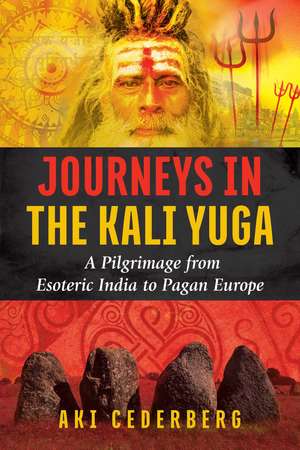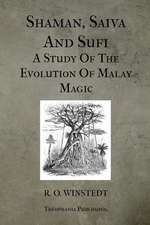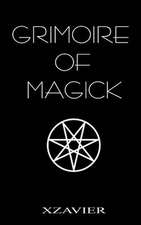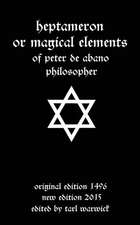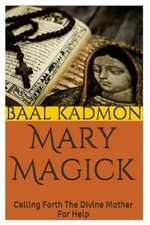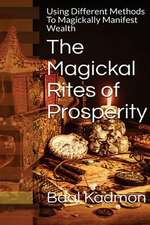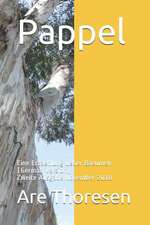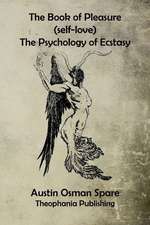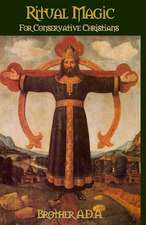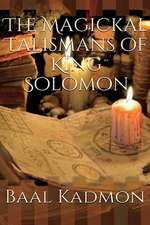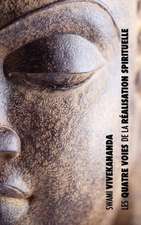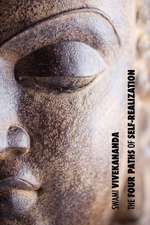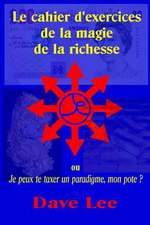Journeys in the Kali Yuga: A Pilgrimage from Esoteric India to Pagan Europe
Autor Aki Cederbergen Limba Engleză Paperback – 10 ian 2018
A beautifully evocative account of one man’s odyssey to discover authentic and unbroken magical traditions in the East and reawaken them in the West
* Shares the similarities he discovered between the teachings of the Indian tradition and the Western traditions of magic, alchemy, and pagan pantheons
* Introduces a wide cast of characters, including Goa Gil, the world-renowned guru of the Goa techno-trance scene, and Mahant Amar Bharti Ji, a “raised-arm Baba,” who for more than 40 years has held up one arm in devotion to Shiva
Beautifully detailing his spiritual pilgrimage from West to East and back again, in the age of strife known as the Kali Yuga, Aki Cederberg shares the authentic and unbroken magical traditions he experienced in India and Nepal and how his search for a spiritual homeland ultimately led him back to his native Europe.
Cederberg explains how his odyssey began as a search for spiritual roots, something missing in the spiritually disconnected life of the Western world. Traveling to India, he encounters the ancient esoteric order of mystic, wild, naked holy men known as the Naga Babas. Immersing himself in the teachings of the tradition, he receives an initiation and partakes in the Kumbh Mela, the largest spiritual gathering on Earth. He starts to glimpse resemblances and analogies between the teachings of the Indian tradition and the Western traditions of magic, alchemy, and pagan pantheons.
After extensive traveling and immersing himself in the extraordinary world of India, Cederberg returns to his native soil of Europe. Traveling to holy places where old pagan divinities still linger in the shadows of the modern world, he dreams of forgotten gods and contemplates how they might be awakened yet again, reconnecting the West with its own pre-Christian spiritual traditions, sacred landscapes, and soul.
* Shares the similarities he discovered between the teachings of the Indian tradition and the Western traditions of magic, alchemy, and pagan pantheons
* Introduces a wide cast of characters, including Goa Gil, the world-renowned guru of the Goa techno-trance scene, and Mahant Amar Bharti Ji, a “raised-arm Baba,” who for more than 40 years has held up one arm in devotion to Shiva
Beautifully detailing his spiritual pilgrimage from West to East and back again, in the age of strife known as the Kali Yuga, Aki Cederberg shares the authentic and unbroken magical traditions he experienced in India and Nepal and how his search for a spiritual homeland ultimately led him back to his native Europe.
Cederberg explains how his odyssey began as a search for spiritual roots, something missing in the spiritually disconnected life of the Western world. Traveling to India, he encounters the ancient esoteric order of mystic, wild, naked holy men known as the Naga Babas. Immersing himself in the teachings of the tradition, he receives an initiation and partakes in the Kumbh Mela, the largest spiritual gathering on Earth. He starts to glimpse resemblances and analogies between the teachings of the Indian tradition and the Western traditions of magic, alchemy, and pagan pantheons.
After extensive traveling and immersing himself in the extraordinary world of India, Cederberg returns to his native soil of Europe. Traveling to holy places where old pagan divinities still linger in the shadows of the modern world, he dreams of forgotten gods and contemplates how they might be awakened yet again, reconnecting the West with its own pre-Christian spiritual traditions, sacred landscapes, and soul.
Preț: 88.83 lei
Nou
Puncte Express: 133
Preț estimativ în valută:
16.100€ • 17.75$ • 14.07£
16.100€ • 17.75$ • 14.07£
Carte disponibilă
Livrare economică 15-29 martie
Livrare express 01-07 martie pentru 23.09 lei
Preluare comenzi: 021 569.72.76
Specificații
ISBN-13: 9781620556795
ISBN-10: 1620556790
Pagini: 200
Ilustrații: Includes 8-page color insert and 20 b&w illustrations
Dimensiuni: 152 x 229 x 28 mm
Greutate: 0.32 kg
Editura: Inner Traditions/Bear & Company
Colecția Destiny Books
ISBN-10: 1620556790
Pagini: 200
Ilustrații: Includes 8-page color insert and 20 b&w illustrations
Dimensiuni: 152 x 229 x 28 mm
Greutate: 0.32 kg
Editura: Inner Traditions/Bear & Company
Colecția Destiny Books
Notă biografică
Aki Cederberg is a writer, musician, and filmmaker, who gives talks and lectures on esoteric topics. An extensive traveler, he has written for The Fenris Wolf book anthologies published in Sweden as well as several other publications. A member of several Finnish musical groups and a part of the podcast Radio Wyrd, he lives in Helsinki, Finland.
Extras
Chapter 4
Kumbh Mela--The Last Rites
It was late March and I was on a train again, headed for the Kumbh Mela, the largest gathering of people for a spiritual, magical, or religious purpose on planet Earth. The train was packed to the hilt, and it was a small miracle that I had been able to secure a ticket the evening before. Unpleasantly hot even in the middle of the night, the train filled with sounds of rattling, snoring, and farts. I was on my way from Delhi via night train to Hardwar, a journey of only a little over 200 kilometers, which nevertheless took virtually all night. As I lay awake in the uppermost bunk in the shuffling train, having arrived in India the previous morning, I sensed something different from my past journeys here. Sometimes all the things one gathers and carries along with oneself can become a heavy load to bear. Perhaps this time I was here to let go of something, to cleanse myself of something.
As the train finally arrived, the bustling city of Hardwar looked surreal in the early morning twilight. Everywhere there were people, so many of them, and I had to step over sleeping bodies scattered on the ground to get anywhere. People from all over India, as well as from everywhere else in the world, kept arriving here in droves, train upon train, busload after busload, by vehicle or on foot. The roads were regularly closed to public traffic, which meant that you could not get into the city at all. Everywhere there were families, beggars, pilgrims, soldiers, and especially sadhus of all kinds. In the past sadhus were a relatively rare sight for me to behold, but now suddenly they were everywhere. They sat under trees and stared, with that haunting, otherworldly look that is characteristic to them. But all this was not really a surprise. The Kumbh Mela was after all a gathering of such magnitude that it was actually visible from space. And I, at heart a loner, who often felt crowded even in a room full of people, was now here in the midst of this raging, swarming mass of millions.
The origins of the Kumbh Mela festival are steeped in ancient history, going back to mythological events. Kumbh Mela is a composite of two words: kumbh from Sanskrit, meaning “pitcher,” and mela, meaning “fair” or “gathering.” The story goes that the gods and demons came together to churn the primordial ocean of milk for the greatest of treasures, amrit, the nectar of immortality, to be distributed to everyone afterward. However, one of the demons sneaked in line and stole the pitcher containing the amrit. Twelve days and nights (equal to twelve human years) the gods and demons fought over the pitcher. At one point Krishna flew away with the pot, accidentally spilling four drops from it that landed on earth. Those four places are now among the holiest in all of India--Prayag, Hardwar, Ujjain, and Nashik--and are the sites of the Kumbh Mela held every four years. At specific dates and times in these places, according to the position of the sun, moon, and stars, it is said that amrit appears. And on those dates everyone comes here to take a bath in the Ganga and to receive a drop of the amrit; millions and millions of people become pilgrims for those brief moments when the heavenly, death-conquering nectar is flowing, echoing a tradition from time immemorial.
In the middle of this storm of activity, amid the crowds and the hustle and bustle, there was a center of relative calm--the Juna Akhara. The Juna Akhara was the largest Akhara, or division, of the mystical, militant order of Naga Babas, reputedly founded in the prehistoric Treta age by Dattatreya, the naked one. They were finally organized into a proper order by Adi Shankara in the fifth century BCE in order to protect Sanatan Dharma, the Hindu religion--what the Naga Babas themselves view as the natural order of the universe. Centered around the Maya Devi temple, the Juna Akhara was a sprawling encampment of a literal army of Naga Babas--the naked ones, the wild, wandering mystics, the holy madmen of Shiva. Their encampments consisted of shacks built around the multitudes of dhunis (sacred fires) that were tended by an entourage of ghostly looking creatures. Stepping into the Akhara was like stepping into another time and another world--an extraordinary world, where all previous rules and rationality simply ceased to exist.
It was evening when I entered the Juna Akhara encampment for the first time. I approached the dhuni, surrounded by an entourage of Naga Babas, removed my shoes, and clasped my hands together, saying “Om Namo Narayan” to all those present. “OM NAMO NARAYAN!” came the booming chorus in response. I greeted, in the traditional way, first the dhuni and then the Babas presiding over it. The stern-looking Babas eyed me somewhat suspiciously as I paid my respects and received some water and ashes. I had brought some flowers, which I set decoratively at the sides of the dhuni, after which I sat down in silence. A few of the Babas finally nodded in smiling agreement.
My initial reaction to all of this of course, as I told Baba Rampuri a few days later, was a strong “What the fuck am I doing here?” It was all quite overwhelming and disorienting, suddenly bursting into this alien, foreign, fairytale world. Rampuri offered me an analogy for my situation. I was no longer my ordinary self, but a character, Adinath Puri, in a story written on the surface of the stars. The story was not a new one, but indeed the great story of all times: the story of the quest of the hero.
Kumbh Mela--The Last Rites
It was late March and I was on a train again, headed for the Kumbh Mela, the largest gathering of people for a spiritual, magical, or religious purpose on planet Earth. The train was packed to the hilt, and it was a small miracle that I had been able to secure a ticket the evening before. Unpleasantly hot even in the middle of the night, the train filled with sounds of rattling, snoring, and farts. I was on my way from Delhi via night train to Hardwar, a journey of only a little over 200 kilometers, which nevertheless took virtually all night. As I lay awake in the uppermost bunk in the shuffling train, having arrived in India the previous morning, I sensed something different from my past journeys here. Sometimes all the things one gathers and carries along with oneself can become a heavy load to bear. Perhaps this time I was here to let go of something, to cleanse myself of something.
As the train finally arrived, the bustling city of Hardwar looked surreal in the early morning twilight. Everywhere there were people, so many of them, and I had to step over sleeping bodies scattered on the ground to get anywhere. People from all over India, as well as from everywhere else in the world, kept arriving here in droves, train upon train, busload after busload, by vehicle or on foot. The roads were regularly closed to public traffic, which meant that you could not get into the city at all. Everywhere there were families, beggars, pilgrims, soldiers, and especially sadhus of all kinds. In the past sadhus were a relatively rare sight for me to behold, but now suddenly they were everywhere. They sat under trees and stared, with that haunting, otherworldly look that is characteristic to them. But all this was not really a surprise. The Kumbh Mela was after all a gathering of such magnitude that it was actually visible from space. And I, at heart a loner, who often felt crowded even in a room full of people, was now here in the midst of this raging, swarming mass of millions.
The origins of the Kumbh Mela festival are steeped in ancient history, going back to mythological events. Kumbh Mela is a composite of two words: kumbh from Sanskrit, meaning “pitcher,” and mela, meaning “fair” or “gathering.” The story goes that the gods and demons came together to churn the primordial ocean of milk for the greatest of treasures, amrit, the nectar of immortality, to be distributed to everyone afterward. However, one of the demons sneaked in line and stole the pitcher containing the amrit. Twelve days and nights (equal to twelve human years) the gods and demons fought over the pitcher. At one point Krishna flew away with the pot, accidentally spilling four drops from it that landed on earth. Those four places are now among the holiest in all of India--Prayag, Hardwar, Ujjain, and Nashik--and are the sites of the Kumbh Mela held every four years. At specific dates and times in these places, according to the position of the sun, moon, and stars, it is said that amrit appears. And on those dates everyone comes here to take a bath in the Ganga and to receive a drop of the amrit; millions and millions of people become pilgrims for those brief moments when the heavenly, death-conquering nectar is flowing, echoing a tradition from time immemorial.
In the middle of this storm of activity, amid the crowds and the hustle and bustle, there was a center of relative calm--the Juna Akhara. The Juna Akhara was the largest Akhara, or division, of the mystical, militant order of Naga Babas, reputedly founded in the prehistoric Treta age by Dattatreya, the naked one. They were finally organized into a proper order by Adi Shankara in the fifth century BCE in order to protect Sanatan Dharma, the Hindu religion--what the Naga Babas themselves view as the natural order of the universe. Centered around the Maya Devi temple, the Juna Akhara was a sprawling encampment of a literal army of Naga Babas--the naked ones, the wild, wandering mystics, the holy madmen of Shiva. Their encampments consisted of shacks built around the multitudes of dhunis (sacred fires) that were tended by an entourage of ghostly looking creatures. Stepping into the Akhara was like stepping into another time and another world--an extraordinary world, where all previous rules and rationality simply ceased to exist.
It was evening when I entered the Juna Akhara encampment for the first time. I approached the dhuni, surrounded by an entourage of Naga Babas, removed my shoes, and clasped my hands together, saying “Om Namo Narayan” to all those present. “OM NAMO NARAYAN!” came the booming chorus in response. I greeted, in the traditional way, first the dhuni and then the Babas presiding over it. The stern-looking Babas eyed me somewhat suspiciously as I paid my respects and received some water and ashes. I had brought some flowers, which I set decoratively at the sides of the dhuni, after which I sat down in silence. A few of the Babas finally nodded in smiling agreement.
My initial reaction to all of this of course, as I told Baba Rampuri a few days later, was a strong “What the fuck am I doing here?” It was all quite overwhelming and disorienting, suddenly bursting into this alien, foreign, fairytale world. Rampuri offered me an analogy for my situation. I was no longer my ordinary self, but a character, Adinath Puri, in a story written on the surface of the stars. The story was not a new one, but indeed the great story of all times: the story of the quest of the hero.
Cuprins
Foreword: For One Who Wanders Widely
By Michael Moynihan
Words of Power: A Translator’s Foreword to an Untranslated Work By Ike Vil
Acknowledgments
Introduction
1 Pilgrimage
2 Between Worlds
3 Initiation
4 Kumbh Mela--The Last Rites
5 The River of Story
6 Festivals of Spring
7 Earth Turns into Gold
8 A Wolf Age
9 Dreams of Forgotten Gods
Glossary
By Michael Moynihan
Words of Power: A Translator’s Foreword to an Untranslated Work By Ike Vil
Acknowledgments
Introduction
1 Pilgrimage
2 Between Worlds
3 Initiation
4 Kumbh Mela--The Last Rites
5 The River of Story
6 Festivals of Spring
7 Earth Turns into Gold
8 A Wolf Age
9 Dreams of Forgotten Gods
Glossary
Recenzii
"In his rip-roaring English-language debut, Cederberg sets himself as neither guide nor guru, allowing readers to truly participate in his journey without worrying about what exactly they are supposed to learn."
“This book promises to be a pagan classic. It took rare initiations into the wonders and horrors of sacred India for Cederberg to recognize the same gods, under different names, stirring in his Nordic homeland. His pilgrimage will inspire anyone who seeks or glimpses these ‘beacons of spirit in a soulless age.’”
“Often one has to travel far afield to the farthest edge to find out where one belongs. Aki Cederberg tells us the fascinating tale of his journey to the wild heart of mythical India, a journey that changed his life and led him back to his roots.”
“Cederberg has made the outer and inner journey from one end of the geography of tradition to the other, which is only an outer reflection of the inner journey many pilgrims make from the outer world to inner experience. What is remarkable about Cederberg’s journey is that he, like Odysseus of old, found his way home again. The knowledge he gathered on his journeys gave him the tools he needed to discover the inner treasures of his own homeland. By reading this book you can gather some of this knowledge without ever going to India.”
“From the erotic passion of Shiva to the surreal bliss of the Khumb Mela, Aki Cederberg chronicles his search for meaning in modern India. But, as he discovered, ‘Pilgrimages have to come to an end. Ultimately, one must return home’--not just physically but spiritually as well. His story of how his own native European gods called to him is powerful, beautiful, irresistible. This book bears an important message for our times and delivers it in a way that captivates the reader. I recommend Journeys in the Kali Yuga without reservation.”
“Aki Cederberg is an outsider in the modern, spiritually barren West. His quest for a sense of spiritual place takes him to the exotic East. There he is an outsider as well but is allowed something close to an insider’s participation in a living pagan religious tradition. Instead of satisfaction, he finds only more yearning--for the largely forgotten traditions of his own people. Cederberg’s journey--which makes for a highly colorful, absorbing tale--functions as a kind of initiation into those traditions. It is a journey home.”
“This book is as much a classical adventure story as it is a tale of genuine spiritual progress. Cederberg’s travels in search of the roots of pagan/religious culture and how they affect us is both a personal vision quest and a wider speculation. Every plant has its roots, and Cederberg is generous to share his own roots exploration in such an eloquent way. The book is inspiring, intelligent, and a truly great read.”
“Unlike the congratulatory stories told by self-proclaimed gurus or superhero yoga masters, this is the spiritual autobiography of a guy like you or me who’s just trying to figure it all out in a world that has lost its way.”
“Ever since the Beatles, India has had its fair share of ‘spiritual’ tourists. Aki Cederberg is not one of them. The gurus and babas he described having encountered there obviously viewed him as a sincere spiritual pilgrim. His odyssey to the East seems best summed up in the lines of a poem by T. S. Eliot in Four Quartets: ‘And the end of all our exploring will be to arrive where we started and know the place for the first time.’”
“Aki Cederberg’s Journeys in the Kali Yuga offers a visceral, gritty, and at times humorous account of the dreamlike world of Indian Naga Babas. A story of an ongoing search for something real in a world where the deepest concerns of human spirit have become mere commodities, this is a timely book about timeless topics.”
“Written in poetical prose that is sharp, witty, and honest, the book is a valuable offering to all seekers and pilgrims on the eternal search of self.”
“Whereas most Westerners drawn to Indian spirituality have an interest in yoga or meditation, it was his passion for magic that led Aki Cederberg to the Naga Babas. With a background within European pagan magic, he is particularly capable of appreciating the esoteric dimensions of the yoga tradition--dimensions largely shunned within modern Western yoga.”
"Aki Cederberg’s Journeys in the Kali Yuga is a unique addition to a very long and venerable tradition of travel writing by Westerners who have spent time in the East. This book is recommended for anyone who wants to know modern India, and still more to benefit from the experiences of a serious seeker on the path to a better understanding of himself and his genuine, rooted identity."
“This book promises to be a pagan classic. It took rare initiations into the wonders and horrors of sacred India for Cederberg to recognize the same gods, under different names, stirring in his Nordic homeland. His pilgrimage will inspire anyone who seeks or glimpses these ‘beacons of spirit in a soulless age.’”
“Often one has to travel far afield to the farthest edge to find out where one belongs. Aki Cederberg tells us the fascinating tale of his journey to the wild heart of mythical India, a journey that changed his life and led him back to his roots.”
“Cederberg has made the outer and inner journey from one end of the geography of tradition to the other, which is only an outer reflection of the inner journey many pilgrims make from the outer world to inner experience. What is remarkable about Cederberg’s journey is that he, like Odysseus of old, found his way home again. The knowledge he gathered on his journeys gave him the tools he needed to discover the inner treasures of his own homeland. By reading this book you can gather some of this knowledge without ever going to India.”
“From the erotic passion of Shiva to the surreal bliss of the Khumb Mela, Aki Cederberg chronicles his search for meaning in modern India. But, as he discovered, ‘Pilgrimages have to come to an end. Ultimately, one must return home’--not just physically but spiritually as well. His story of how his own native European gods called to him is powerful, beautiful, irresistible. This book bears an important message for our times and delivers it in a way that captivates the reader. I recommend Journeys in the Kali Yuga without reservation.”
“Aki Cederberg is an outsider in the modern, spiritually barren West. His quest for a sense of spiritual place takes him to the exotic East. There he is an outsider as well but is allowed something close to an insider’s participation in a living pagan religious tradition. Instead of satisfaction, he finds only more yearning--for the largely forgotten traditions of his own people. Cederberg’s journey--which makes for a highly colorful, absorbing tale--functions as a kind of initiation into those traditions. It is a journey home.”
“This book is as much a classical adventure story as it is a tale of genuine spiritual progress. Cederberg’s travels in search of the roots of pagan/religious culture and how they affect us is both a personal vision quest and a wider speculation. Every plant has its roots, and Cederberg is generous to share his own roots exploration in such an eloquent way. The book is inspiring, intelligent, and a truly great read.”
“Unlike the congratulatory stories told by self-proclaimed gurus or superhero yoga masters, this is the spiritual autobiography of a guy like you or me who’s just trying to figure it all out in a world that has lost its way.”
“Ever since the Beatles, India has had its fair share of ‘spiritual’ tourists. Aki Cederberg is not one of them. The gurus and babas he described having encountered there obviously viewed him as a sincere spiritual pilgrim. His odyssey to the East seems best summed up in the lines of a poem by T. S. Eliot in Four Quartets: ‘And the end of all our exploring will be to arrive where we started and know the place for the first time.’”
“Aki Cederberg’s Journeys in the Kali Yuga offers a visceral, gritty, and at times humorous account of the dreamlike world of Indian Naga Babas. A story of an ongoing search for something real in a world where the deepest concerns of human spirit have become mere commodities, this is a timely book about timeless topics.”
“Written in poetical prose that is sharp, witty, and honest, the book is a valuable offering to all seekers and pilgrims on the eternal search of self.”
“Whereas most Westerners drawn to Indian spirituality have an interest in yoga or meditation, it was his passion for magic that led Aki Cederberg to the Naga Babas. With a background within European pagan magic, he is particularly capable of appreciating the esoteric dimensions of the yoga tradition--dimensions largely shunned within modern Western yoga.”
"Aki Cederberg’s Journeys in the Kali Yuga is a unique addition to a very long and venerable tradition of travel writing by Westerners who have spent time in the East. This book is recommended for anyone who wants to know modern India, and still more to benefit from the experiences of a serious seeker on the path to a better understanding of himself and his genuine, rooted identity."
Descriere
A beautifully evocative account of one man’s odyssey to discover authentic and unbroken magical traditions in the East and reawaken them in the West
